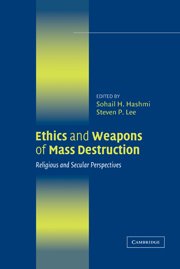Book contents
- Frontmatter
- Contents
- Tables and Figures
- Acknowledgments
- Abbreviations
- Ethics and Weapons of Mass Destruction
- Introduction
- 1 Weapons of Mass Destruction: A Brief Overview
- 2 The International Law Concerning Weapons of Mass Destruction
- PART ONE THE ORIGINAL DEBATE
- 3 Realist Perspectives on Ethical Norms and Weapons of Mass Destruction
- 4 Realism and Weapons of Mass Destruction: A Consequentialist Analysis
- 5 Natural Law and Weapons of Mass Destruction
- 6 War and Indeterminacy in Natural Law Thinking
- 7 Liberalism: The Impossibility of Justifying Weapons of Mass Destruction
- 8 A Liberal Perspective on Deterrence and Proliferation of Weapons of Mass Destruction
- 9 Christianity and Weapons of Mass Destruction
- 10 Christian Apocalypticism and Weapons of Mass Destruction
- PART TWO EXPANDING THE CONVERSATION
- PART THREE CRITICAL PERSPECTIVES
- Contributors
- Index
6 - War and Indeterminacy in Natural Law Thinking
Published online by Cambridge University Press: 05 June 2012
- Frontmatter
- Contents
- Tables and Figures
- Acknowledgments
- Abbreviations
- Ethics and Weapons of Mass Destruction
- Introduction
- 1 Weapons of Mass Destruction: A Brief Overview
- 2 The International Law Concerning Weapons of Mass Destruction
- PART ONE THE ORIGINAL DEBATE
- 3 Realist Perspectives on Ethical Norms and Weapons of Mass Destruction
- 4 Realism and Weapons of Mass Destruction: A Consequentialist Analysis
- 5 Natural Law and Weapons of Mass Destruction
- 6 War and Indeterminacy in Natural Law Thinking
- 7 Liberalism: The Impossibility of Justifying Weapons of Mass Destruction
- 8 A Liberal Perspective on Deterrence and Proliferation of Weapons of Mass Destruction
- 9 Christianity and Weapons of Mass Destruction
- 10 Christian Apocalypticism and Weapons of Mass Destruction
- PART TWO EXPANDING THE CONVERSATION
- PART THREE CRITICAL PERSPECTIVES
- Contributors
- Index
Summary
The preceding chapter by C. A. J. Coady is instructive on a variety of intellectual issues and impressive in its readiness to present moral conclusions that make serious demands on contemporary Western societies and their political leaders. In what follows, I do not attempt a detailed criticism of his paper, in which I find little to disagree with. In particular, I welcome his presentation of natural law in a way that acknowledges its significant departures from a deductive model of ethical reasoning (despite the deductivist language that Aquinas employs in a number of key places). Rather, I want to focus on making two points, one about natural law and one about warfare; these points will, I think, give us an alternative reading of the place of natural law arguments and a different approach to making moral judgments about weapons of mass destruction. The points turn on the large element of indeterminacy in natural law arguments.
The first point is about natural law. We need to direct our attention to something that is not well articulated in Aquinas's account of natural law and that actually seems to be repudiated in Hobbes's approach to natural law. This is the role of institutions in specifying the application of moral principles and in providing us with a reasonable expectation that actions taken in accordance with these moral principles will be broadly intelligible within a culture and will enable us to appraise agents in ways that converge toward an agreement of judgments.
- Type
- Chapter
- Information
- Ethics and Weapons of Mass DestructionReligious and Secular Perspectives, pp. 132 - 138Publisher: Cambridge University PressPrint publication year: 2004



